Related Research Articles
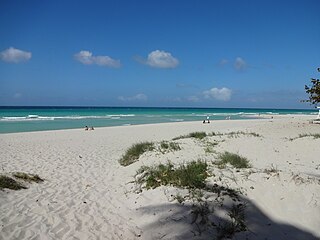
Varadero, also referred to as Playa Azul, is a resort town in the province of Matanzas, Cuba, and one of the largest resort areas in the Caribbean. Varadero Beach is rated one of the world's best beaches in TripAdvisor's Traveler's Choice Awards since 2019, ranking at number 9 as of January 2024. Common activities include fishing and excursions to Matanzas, Cárdenas, and the Península de Zapata.
Hip hop music arrived in Cuba via radio and TV broadcasts from Miami. During the 1980s, hip hop culture in Cuba was mainly centered on breakdancing. By the 1990s, with the collapse of the Soviet Union and the onset of the Special Period, young rappers, exposed to foreign tourists whose wealth highlighted their struggle, turned to rapping to affirm their heritage and advocate for further revolutionary reforms.
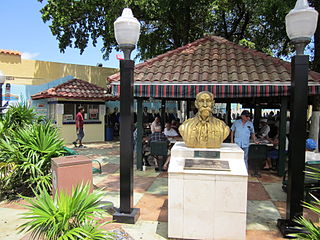
Little Havana is a neighborhood of Miami, Florida, United States. Home to many Cuban exiles, as well as many immigrants from Central and South America, Little Havana is named after Havana, the capital and largest city in Cuba.
LGBT History Month is an annual month-long observance of lesbian, gay, bisexual and transgender history, and the history of the gay rights and related civil rights movements. It was founded in 1994 by Missouri high-school history teacher Rodney Wilson. LGBT History Month provides role models, builds community, and represents a civil rights statement about the contributions of the LGBTQ+ community. As of 2022, LGBT History Month is a month-long celebration that is specific to Australia, Canada, Cuba, Finland, Germany, Hungary, Italy, the United Kingdom and the United States.

The World Outgames were a sporting and cultural event hosted by the gay community. The Outgames were open to all who wish to participate, without regard to sexual orientation. There were no qualifying standards, although competitions were arranged according to the skill levels of the competitors. The Outgames brought together athletes and artists from all over the world, many from countries where homosexuality remains illegal and hidden.

Lesbian, gay, bisexual, transgender, and queer (LGBTQ) rights in Cuba have significantly varied throughout modern history. Cuba is now considered generally progressive, with vast improvements in the 21st century for such rights. Following the 2022 Cuban Family Code referendum, there is legal recognition of the right to marriage, unions between people of the same sex, same-sex adoption and non-commercial surrogacy as part of one of the most progressive Family Codes in Latin America. Until the 1990s, the LGBT community was marginalized on the basis of heteronormativity, traditional gender roles, politics and strict criteria for moralism. It was not until the 21st century that the attitudes and acceptance towards LGBT people changed to be more tolerant.

Favela Rising is a 2005 documentary film by American directors Jeff Zimbalist and Matt Mochary. It was produced by Sidetrack Films and VOY Pictures. It debuted at the Tribeca Film Festival on April 24, 2005, where it won the award for Best New Documentary Filmmaker for Zimbalist and Mochary. The film's look at life in Brazil's slums won it further awards such as Best Documentary Film from the New York Latino Film Festival and Best Feature Documentary from Big Sky Documentary Film Festival. The film has won over twenty-five international festival awards and was short-listed for an Oscar.
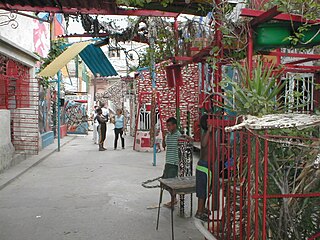
Cuban art is an exceptionally diverse cultural blend of North American, South American, European, and African elements, reflecting the diverse demographic makeup of the island. Cuban artists embraced European modernism, and the early part of the 20th century saw a growth in Cuban avant-garde movements, which were characterized by the mixing of modern artistic genres. Some of the more celebrated 20th-century Cuban artists include Amelia Peláez (1896–1968), best known for a series of mural projects, and painter Wifredo Lam, who created a highly personal version of modern primitivism. The Cuban-born painter Federico Beltran Masses (1885–1949), was renowned as a colorist whose seductive portrayals of women sometimes made overt references to the tropical settings of his childhood.
For the film see Alamar (film)
The Documentary Film Institute, is an independent organization within San Francisco State University that is dedicated to support non-fiction cinema by promoting documentary films and filmmakers and producing films on socially and culturally important topics which deserve wider recognition. The director is Soumyaa Kapil Behrens, a professor in the cinema department at SFSU. It is situated within the College of Liberal & Creative Arts at San Francisco State University, with access to a broad cross-section of educational institutions in San Francisco and the Bay Area. It is a resource for undergraduate and graduate students studying film in the area as well as faculty interested in the artistic and politic dimensions of documentary cinema.
Battle rap is a type of rapping performed between two or more performers that incorporates boasts, insults, wordplay and disses originating in the African-American community. Battle rap is often performed spontaneously, or freestyled, in live battles known as rap battles, where participants will compete on the same stage to see who has the better verses.
Havana Jam was a three-day music festival that took place at the Karl Marx Theatre in Havana, Cuba, from March 2 to March 4, 1979. The event was sponsored by Bruce Lundvall, the president of Columbia Records, Jerry Masucci, the president of Fania Records, and the Cuban Ministry of Culture.
Havana, Cuba, is a host city to numerous events and festivals.
Now known as the Toronto Caribbean Carnival, Caribana began as a one-time celebration of the Canadian Centennial in Ontario's provincial capital city. The festival continues to bring a full display of Caribbean culture and traditions, attracting more than a million viewers each year. Caribana has continued to draw people from across the world to Toronto, with travellers coming from places such as the Caribbean, Europe and the United States.
Minsk Pride is a gay pride parade in Minsk, Belarus. This is a festival in support of tolerance for gays, lesbians, bisexuals and transgender people in Belarus.

The 15th World Festival of Youth and Students (WFYS) was organized by the World Federation of Democratic Youth (WFDY) in Algiers, Algeria, from 8 to 16 August 2001 for nine days, under the slogan "Let's globalize the struggle for Peace, Solidarity, Development, against Imperialism". The festival was the first organized in an Arab country, as well as the first in Africa and brought together 11,000 delegates from over 100 countries from around the world. International preparatory meetings took place in Cuba, India, Cyprus and Algeria itself. The event came after the successful revival of the festival movement at the 14th World Festival of Youth and Students in Havana, Cuba, and marked a continuation of the internationalist and anti-imperialist youth festival spirit.
Krudas Cubensi, also known as Las Krudas, is an activist hip-hop group with black feminist, queer and vegan politics. Born in Cuba in the 1990s, it is part of the Caribbean diaspora in the United States since 2006. They are now called Krudxs Cubensi, to reflect their non-binary indentity.
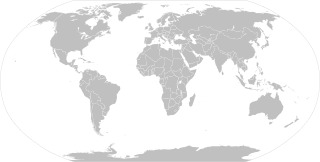
Two cities initially submitted bids to host the 1987 Pan American Games that were recognized by the Pan American Sports Organization. On July 12, 1981, Santiago was selected over Quito by PASO to host the X Pan American Games after the first round of voting at its general assembly held in Caraballeda, Venezuela.
PerifaCon, also informally called Comic Con da Favela, is a comic book event held since 2019 in São Paulo with a focus on reaching mainly the public from the outskirts of São Paulo, who are hardly able to participate in large events such as CCXP due to cost and distance.
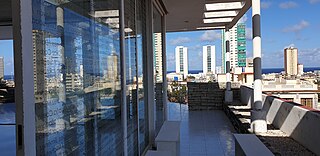
The Ludwig Foundation of Cuba (LFC) is a non-governmental, non-profit institution located in Havana, Cuba, created with the mission of protecting and promoting Cuban artists in Cuba and internationally.
References
- ↑ "Hip-hop not getting bad rap in Cuba". Archived from the original on 2007-09-03. Retrieved 2008-02-08.
- ↑ Pacini-Hernandez, Deborah and Reebee Garofalo. "The emergence of rap Cubano: An historical perspective." In Music, Space, and Place, ed. Whitely, Bennett, and Hawkins, 89-107. Burlington, VT: Ashgate, 2004.